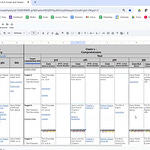Promoting Fluency Through Challenge: Repeated Reading With Texts of Varying Complexity, by Jake Downs, Chase Young, and Alycia Cole in The Reading Teacher
“Makeup work” doesn’t really make up for missing school—Justin Baeder @eduleadership on TikTok
Full Transcript:
Welcome to the Eduleadership Show. I’m your host, Justin Baeder, and in this episode we’ll be talking about scaffolding grade level text with repeated reading, and we’ll look at a protocol for doing just that. We’ll talk about learning on vacation and what we can realistically expect students to get done when they are on vacation. And we’ll talk about how many nights a week students should read. Let’s get to it.
First up, in a new article in the Reading teacher published by the International Literacy Association authors, Jake Downs, chase Young and Alycia Cole report on a study. They did a pilot study with third and fourth grade students and they especially report the results for fourth graders, taking them through a protocol for repeated reading as an attempt to scaffold grade level or above grade level texts. And this is a great paper to read. It’s fairly readable, it is technical, but I think it’s very digestible and introduces a lot of background about reading that may be helpful to you.
The article is titled Promoting Fluency Through Challenge, repeated Reading with texts of varying complexity. And the texts were not part of a single focused topic. They were on a variety of topics, but what the study had them do was work with a paraprofessional head students in say groups of five, work with a paraprofessional over about 50 sessions to read through a text five times, five different ways.
The first way in this protocol, which they’re titling read Like us, was to do a model read. So the paraprofessional, the adult would read through the text fluently to model for students how to read it. And remember, this is a text that’s going to be challenging for students. It may have unfamiliar vocabulary, it may have content that students don’t have a lot of background knowledge on, and that is the point it is to introduce that vocabulary and background knowledge and build students fluency and their ability to pronounce and read fluently and all the elements of proficient oral reading.
So the first read is a model read. Then the second read is an echo read, and the echo read is essentially repeat after me. So I’ll read a sentence and then the class will or the group will repeat the sentence after me. The third read is a choral read and they’re not necessarily doing these all back to back. They may be doing these in subsequent sessions, mixing it up a little bit. But on the choral read, students are all reading aloud together.
Then in the fourth read they’re reading with a partner and then in the fifth read, a student is reading by themselves to everyone else. And I love how this strategy builds in the scaffolding without a whole lot of extra prep work for the teacher or for the paraprofessional. It is simply reading the text multiple times. And I really appreciate the way the authors dug into a lot of the background research on what this builds, why this works, and they actually measured the impact as well.
So I look forward to hearing more on repeated reading and on the read like Us Protocol. And I’m actually looking to interview some teachers who have used this strategy or a strategy like it. So if you have used this approach or you’re interested in trying it, please reach out and I’d love to interview you for a new show that I’m doing more on that soon.
Next up, let’s talk about when students go on vacation during the school year. Now, certainly there are once in a lifetime opportunities, family reunions, special trips, weddings and funerals, all kinds of family events that students will be out of school for. And I think we understand when those things occur, but we don’t want them to occur too often, right? We want students to be on track with their learning and to do that they really need to be in school.
In this video I talk a little bit about why that is, why we can’t really send the whole experience of being in class and learning home with students so they can take it on vacation in some sort of packet form. Take a look and let know what you think.
What parents often don’t realize when they ask for makeup work so they can go on vacation during the school year is that the whole experience of a class in school can’t be reduced to a packet that we can send home, right? At least that was never true for my classes. Maybe if you’re reading a novel, you could send a novel, maybe if you’re working through a textbook like in math, the book itself can be sent home and taken on the trip. But the whole experience of learning as we do in school can’t really be taken with you on vacation.
And I think we’ve got to be honest with people and let them know, Hey, if you need to pull your kid out of school so that you can do a once in a lifetime vacation, or if there’s a wedding or a funeral or some other important family event, do what you’ve got to do for your family and for your life. But understand, we can’t replicate the experience of getting an education in packet form. We cannot truly send home makeup work that is in any way equivalent to what the kid is missing by not being in school. Let me know what you think about this and how that works in your subject. But I was a science teacher and if you miss all of the labs, if you miss all of the discussions, if you miss all of the planning, yes, there are some papers that I could send home.
I’m not going to have them weeks in advance. I don’t think that’s reasonable, but even if I did, you wouldn’t be able to do them on your own because we do them in class. A lot of it’s collaborative, A lot of it requires being there for the teaching. A lot of it requires actually doing the lab and I can’t just send that home when I hear that a lot of families now are booking vacations during the school year on purpose because it’s cheaper. Everybody would like to save money. I understand that going at lower demand times can save you money on vacations. School is important. Don’t pull your kid out of school just to go on vacation just to save a little bit of money. They need to be there for their education. Lemme know what you think. So I think there’s no real substitute for being in class.
And if a student is going to take an international trip, a big national parks vacation, some sort of trip where it’s obvious that they will be enriched by it, I don’t think we need to worry too much about sending work with the student to do on their trip. They’re going to learn some things on that trip, but they’re not really going to learn what they’re missing in class because to do that learning, they kind of need to be in class.
So one thing that I think we need to encourage families to be mindful of is not booking those vacations that fall right before a school break. And often it is cheaper. If you book your vacation a week earlier and miss the last week of school before say Christmas break, you probably will save money and you’ll get a longer break as a result. But when a lot of people do that, it really erodes our ability to use all 180 days of the school year and plan a unit that we can actually teach all the way up until the last day before the break.
If we know half of our students are going to be gone, then we’re not really going to be able to do that. But lemme know what you are seeing in regards to this issue.
Lastly, in our continuing coverage of the critical issue that is six seven, I wanted to share a photo that you may have seen making the rounds from Riverview Elementary and Dodge Middle School in Farmington, Minnesota, where they ask rhetorically, how many nights per week should you be reading? And of course the answer is six seven. As I’ve said before on this show, I think the best way to respond to students overusing the phrase six seven is to just roll with it and not make a big deal about it and use it and perhaps make it a bit cringe. And I think we’ll see this wave crest soon.
That’s it for this episode of the Eduleadership Show. I’m Justin Baeder and I’ll see you next time.










